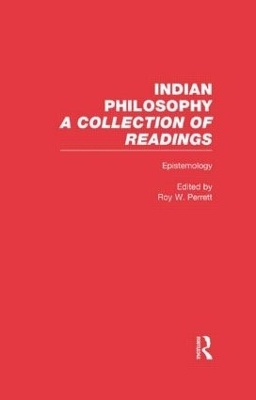
Epistemology
Indian Philosophy
Seiten
2001
Routledge (Verlag)
978-0-8153-3609-9 (ISBN)
Routledge (Verlag)
978-0-8153-3609-9 (ISBN)
Epistemiology is concerned with the nature and scope of Indian pramana theory. The selections in this volume discuss Indian treatments of epistemological topics like the means of knowledge, realism and anti-realism.
First Published in 2001. The five volumes of this series collect together some of the most significant modern contributions to the study of Indian philosophy. Volume 1: Epistemology is concerned with the nature and scope of Indian pramana theory, i.e. that part of Indian philosophy concerned with the nature and sources of knowledge. Indian philosophers developed a causal theory of knowledge and acknowledged the existence of a number of valid ways of knowing, including perception, inference and testimony. The Indian pramana theorists thus discussed many issues that have also occupied Western epistemologists, often offering importantly different perspectives on these matters. They also sometimes addressed various interesting questions about knowledge that are unfamiliar to Western epistemologists. The selections in this volume discuss Indian treatments of epistemological topics like the means of knowledge, realism and anti-realism, truth, knowledge of knowledge, illusion and perceptual error, knowability, testimony, scepticism and doubt.
First Published in 2001. The five volumes of this series collect together some of the most significant modern contributions to the study of Indian philosophy. Volume 1: Epistemology is concerned with the nature and scope of Indian pramana theory, i.e. that part of Indian philosophy concerned with the nature and sources of knowledge. Indian philosophers developed a causal theory of knowledge and acknowledged the existence of a number of valid ways of knowing, including perception, inference and testimony. The Indian pramana theorists thus discussed many issues that have also occupied Western epistemologists, often offering importantly different perspectives on these matters. They also sometimes addressed various interesting questions about knowledge that are unfamiliar to Western epistemologists. The selections in this volume discuss Indian treatments of epistemological topics like the means of knowledge, realism and anti-realism, truth, knowledge of knowledge, illusion and perceptual error, knowability, testimony, scepticism and doubt.
Roy W. Perrett Massey University
Volume Introduction, 1 A Fragment of the Indian Philosophical Tradition -Theory of Prama-a; Nagarjuna as Anti-Realist; Introduction to Gangda's Theory of Truth; Dharmakirti's Theory of Truth; Does Indian Epistemology Concern Justified True Belief? Knowing That One Knows; The Indian Concepts of Knowledge and Self; Padmapada's Illusion Argument; Dreams and Reality: The Sarikarite Critique of Vijfianavada; Dreams and the Coherence of Experience: An Anti-Idealist Critique from Classical Indian Philosophy; Astitva Jiieyatva Abhidheyatva; The Nyaya on Existence, Knowability and Nameability; Is Whatever Exists Knowable and Nameable? On Knowing by Being Told; The Nyaya Theory of Doubt
| Erscheint lt. Verlag | 8.2.2001 |
|---|---|
| Verlagsort | New York |
| Sprache | englisch |
| Maße | 156 x 234 mm |
| Gewicht | 890 g |
| Themenwelt | Geisteswissenschaften ► Philosophie ► Erkenntnistheorie / Wissenschaftstheorie |
| Geisteswissenschaften ► Philosophie ► Östliche Philosophie | |
| ISBN-10 | 0-8153-3609-8 / 0815336098 |
| ISBN-13 | 978-0-8153-3609-9 / 9780815336099 |
| Zustand | Neuware |
| Haben Sie eine Frage zum Produkt? |
Mehr entdecken
aus dem Bereich
aus dem Bereich
die Grundlegung der modernen Philosophie
Buch | Softcover (2023)
C.H.Beck (Verlag)
18,00 €
Buch | Softcover (2023)
Reclam, Philipp (Verlag)
7,00 €

![Was heißt Denken?. Vorlesung Wintersemester 1951/52. [Was bedeutet das alles?] - Martin Heidegger](/media/113619842)
